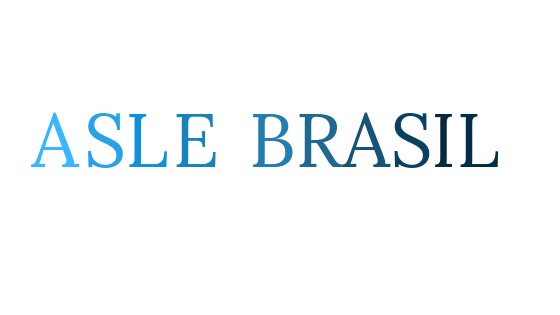Journalism, war and animal activism, an interview with Diana Darke and Alaa Aljallel (The cat man of Aleppo)
About Alaa Aljaleel
Alaa Aljaleel also known as “the cat man of Aleppo” is probably the most famous animal rescuer and animal rights activist today. He is also an humanitarian aid worker. As an ambulance driver and paramedic, in Syrian civil war, Alaa began caring for stray animals in 2013. In 2015, he founded Ernesto Sanctuary or Ernesto’s House,named after his first cat rescued during the war. The Sanctuary helps people and animals caught in the cross fire. He is co-author of the book, The Last Sanctuary in Aleppo. References to AlaaAljaleel’s workapperead in NBC News, Daily Beast, and BBC News.
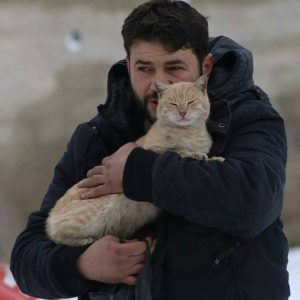
Alaa Aljaleel
About Diana Dark
Diana Dark eisanauthor, Arabic speaker, MiddleEast cultural expertand Syria expert, Arabist, BBC broadcaster and journalist. Her work has appeared in The Guardian, The Financial Times, The Sunday Times, The Daily Telegraph and Al Araby.She is also the author of My House in Damascus, The Merchant of Syria and co-author of The Last Sanctuary in Aleppo.
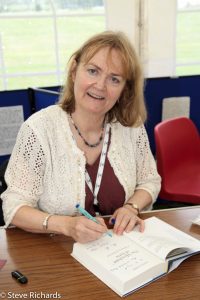
Diana Darke
1. Inteviewer: Zélia Bora: First of all, I want to thank you Diana and AlaaAljaleel for writing “The Last Sanctuary in Aleppo” (2019). In my opinion, the book is one of the most impressive journalistic narratives on the war in Syria, taking into consideration the perspective of a civilian. It is also the first narrative in the English language on war thatbrings together journalism, biography and animal activism. The book also represents a deep sense of truth,critical analysis, and honest opinion towards the immoral and cruel politics of war, as well as the distortion of religious values and culture. Regarding this fabulous story of endurance, love and compassion for the animals and people, I would like to know how did you meet AlaaAljaleel and why did you decide to be co-author to write his life story and mainly, to tell us about his work as an animal and people rescuer during the Syrian war?
Interviwee Diana Dark: The extraordinary thing about this book is that I have never met Alaa face to face – it is not possible because of where he is in Syria, inside rebel-held territory, where foreigners cannot enter legally. Unless the political circumstances change, I may never be able to meet him. But I realized that his story was very important and that it would contribute a unique non-political angle on the war from an ordinary person caught up in it. My hope is that because of the unusual animal focus a different and wider audience would be drawn to read about Syria. That is why I decided to accept when the publishers approached me to write his story. They chose me because they liked “My House in Damascus”, the book I’d written in 2016, and wanted an Arabic-speaking British authorwith a real first-hand understanding of the society and culture of Syria. From the start the only way to get his story to the outside world was through using technology, WhatsApp and voice recordings, so that Alaa could answer my questions. I asked two trusted Syrian friends, Raida Mukarked and Ammar Hasan (husband and wife),to help me with this, as is explained in the book’s Acknowledgements. As far as I am aware, this is the first time a book has been written like this, giving a voice to someone who is still inside Syria.
Z. Diana, it is very clear to me, that your book exceeded the limits of its own genre (print and advocacy journalism)to be defined as a powerful narrative in which memory, history, biography and animal activism are masterly interrelated. By taking into consideration these essential motivators so well introduced, one can also infer that theysustain the basic theme of the narrative: love and compassion towards animals. It is also important to emphasize that Alaa is a man who incorporates a true sense of human morality directed to theOther. Can you tell us, in your opinion, how didAlaa achieve a balance between pacific activism and moral duty towards the Other (animals and humans as well)? In other words, how would you describeAlaa‘sbalance between the love for animals,human necessities and the preservation of the highest moral values such as integrity of character and courage?
D: I agree that Alaa has a wonderful balance between peaceful activism and moral duty towards the Other. Actually in my experience many Syrians have this balance instinctively – most are highly compassionate people with a deep sense of community, something we in the West have often lost. Where he is unusual, is in extending that to animals. It is rare in the Arab world to place compassion with animals on a par with compassion for humans, but Alaa feels this instinctively, because of his own upbringing where he was encouraged to think this way. This is why he is so keen to run awareness courses for the children in his area, so that they can learn to feel the same way. He is convinced that society will benefit across the board if all people can share this compassion for fellow creatures, be they human or animal, and he wants to do his utmost to bring that change about.
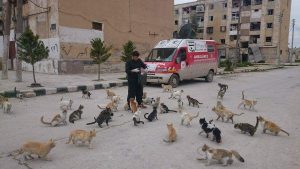
Z: My third and fourth questionsare now directed to Alaa particularly. For me, and I do believe for many others who will read your book, your story is an inspiration, especially, to those who are animal activists and feel morally responsible. There are many passages in your book that direct the reader to embrace values such as altruism, empathy, love and compassion towards animals and children.Among these passages, twocalled my attention, the epigraph: “My sorrow will be over when I find companionship in a cat” (p.96)and that “animals and children are losers in this war” (p.112).Can you comment on both?Can you tell us also,how the creation of the Ernesto Sanctuary reflects your politics of life, survival and tolerance towardsdiversity and, above all the love and respect for animal companions?
Interviwee Alla Aljaleel : Everyday, when I finished my work in helping and rescuing people, and because of the heavy and tough and painful scenes I saw everyday, I was very sad, and felt pain for the victims who fel every day, especially kids and women. I used to feel comfortable in the cats’ house which I founded, or with my cat in the house, I used to sit with my cat and played with her, I felt more comfortable with my cats, I get ride of sadness and pain when I am with these animals. As for my interest in children and animals, we know that the only losers in this war are children and animals because they are the only ones who are innocents. If we are adults, we can not do anything for them, not by words, and not action. The only losers in this war are children and animals, and they need our help.These children and animals need adults’ help so I care about children, especially orphans who have lost their mother or father. I like to take care of them and the little stray cats. Cats and children are similar, orphans and orphaned cats. There are some cats who born in the street, their mother leaves them and go or escape from bombing, because she doesn’t live in a house so her children stay in the street, so I love to take these kittens and take care of them, as well as children they need our help. For me I’m happy when I help kids and cats.
About Ernesto sanctuary, I established Ernesto’s sanctuary in Aleppo which is the first one in Syria. I liked to foundit in order to make children know about these animals who need us to help them, this was my first goal, and the second one was to take care of the little stray cats, or those who were left by their owners when they left the country, we gather them in this place, I liked to establish this place as a refuge for cats, so I let children know about these animals as I take care of the children and help them any time. It was a big challenge to do that during the war. When I helped the animals and fed them in my house the city was bombed, so I went out to help the people and then went back to help the cats and continue to feed them. When I was having a party for kids or taking them to toys land, I also went to the bombing site to help and then went back to the kids. The cats’ house was founded at a very, very difficult time. At that time it was impossible to do something. Nobody could do anything but escape or get out of the country, but on the contrary, I loved doing work in the most difficult circumstances. I wanted to do something for my country, children and animals.
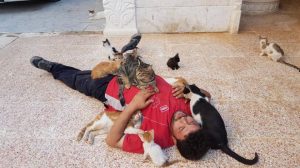

Z: Alaa, in terms of ideas one can understand that there is a profound feeling of deception towards normative politics and religion. These ideas are expressed by the following quotations: “Before the war I was just normal when it came to religion” But after the war I distanced myself from religion” and also, “I am religious in my own way, which is just between me and God” (p.260). About politics, you say: “They are very clever with the way they twist things, together with the Russians. Even the cat sanctuary has been used as part of this propaganda” (260-1) and, “There is no peace plan and no reconciliation. It is up to us to make our own reconciliation” (p.263). Can you comment?
A: My connection to religion was strong and did not decreased after the revolution, but it was hard to pretend that I was religious because the people who showed that they religious, they were bad people. They showed themselves to be religious or to know religion. I stepped back a bit. I know my religion and no one can impose my religion on me. I know my religion well and I know the Quran and know the Sunnah of the Messenger of Allah Muhammad, so no need to anyone to explain to me about religion. People were calling for religiosity and extremism. I stayed away and I was not very religious. There were people who did not know religion but spoke about it and I was surprised that they knew religion so as to intimidate people, I know exactly what I must do for my religion, I know my duties, I studied my religion very well, in addition to that my work is part of my belives, Islam tells me that my work must be noble and good, with all people, children and animals, also helping orphans, I pray and know how to practice, no need to anybody who pretends that he is religious and he wants to teach me the religion, I know how to deal with people and how to behave without need to anybody to teach me. My connection with God is direct I don’t need a mediator. Those people who are extremist are trying to impose some issues in religion which are incorrect. The biggest part of my believe is my work, thank God who gives my power to continue.
The Russian said that I returned to Aleppo after the regime controlled it, but I didn’t return to Aleppo, I live in the countryside of Aleppo. The Russian tried to use the cats’ house to promote for the regime, they said that “ the cat man of Aleppo returned to his work in the sanctuary after the regime army entered Aleppo, to help animals and people.
FINAL REMARKS (by Diana):
It’s become clear to me over the course of writing this book and getting to know Alaa, that he is a wonderful and charismatic person with a deep sense of duty to the children and animals he has taken under his wing. The thing that surprised and impressed me most, in his answers to my questions, was his ability to think deeply, almost like a philosopher, about the problems he has experienced inside his country. I asked him lots of questions about how he thinks war has changed society and about whether war has changed his views on religion, and was very pleased that he felt able to reply so fully. Producing the book together, with Raida and Ammar’s help, has been a wonderful collaborative effort, based on trust.
Interview sent to ASLE Brasil on May 29th 2019.
